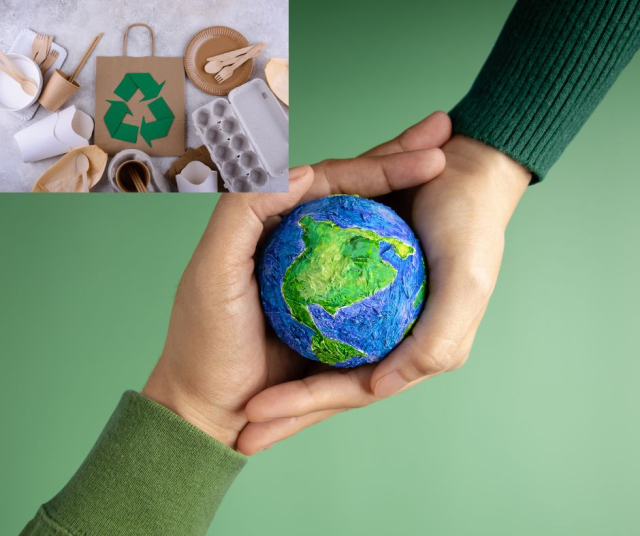In a world increasingly aware of the environmental impact of our actions, adopting a greener lifestyle has become a priority for many. From reducing our plastic consumption to opting for more sustainable forms of transportation, small daily choices can add up to big changes for the well-being of the planet.
1. Reduce, Reuse, Recycle: The Ecological Triad
The ecological triad, composed of reduce, reuse and recycle, represents the fundamental pillars of a more sustainable and environmentally friendly lifestyle. These three actions are not only simple strategies to minimize our ecological footprint, but they also reflect a change in mentality towards more conscious and responsible consumption.
The first step, reducing, involves questioning our needs and consumption habits to avoid the unnecessary generation of waste. This means opting for products with less packaging and avoiding the use of disposable items in favor of durable, reusable alternatives. By reducing the number of objects we acquire and consume, we not only reduce the amount of waste we generate, but we also reduce the demand for natural resources and the energy necessary for their production.
Reuse is another key aspect in the ecological triad, since it invites us to extend the useful life of objects and materials as much as possible. Instead of throwing them away after a single use, we can look for creative ways to give them a second life. This may involve repairing and maintaining items in good condition, as well as donating or exchanging them with others to prolong their usefulness. Reuse not only reduces the amount of waste that ends up in landfills, it also conserves resources and energy that would otherwise be used to manufacture new products.
2. Conscious Consumption: Opting for Sustainable Products
The concept of conscious consumption is based on the idea that our purchasing decisions have a significant impact on the environment and society in general. Adopting a conscious consumption approach involves considering not only the value and utility of a product, but also its environmental and social impact throughout its life cycle.
Opting for sustainable products is an integral part of this process. Sustainable products are those that are manufactured responsibly, using renewable or recycled materials and minimizing waste and pollution during production. By choosing sustainable products, we are supporting business practices that respect environmental boundaries and promote social equity.
One way to identify sustainable products is to look for ecological certifications, such as organic or fair trade labeling, which guarantee that responsible practices have been followed in their production. These certifications provide additional assurance that the product has been manufactured ethically and sustainably, allowing us to make informed decisions aligned with our environmental and social values.
Additionally, it is important to consider the entire life cycle of a product when evaluating its sustainability. This includes not only how the product is produced, but also how it is used and disposed of at the end of its useful life. Opting for high-quality, durable products can reduce the need to replace them frequently, which in turn reduces the amount of waste generated over time. At the same time, choosing products made from recycled or easily recyclable materials can help close the resource loop and reduce demand for raw materials.
3. Sustainable Mobility: Moving Responsibly
Transportation is one of the main sources of greenhouse gas emissions and air pollution. Opting for more sustainable forms of transport, such as walking, cycling or using public transport, can help reduce our environmental impact and improve air quality in our cities.
Additionally, adopting electric or hybrid vehicles can help reduce greenhouse gas emissions associated with driving. As battery technology improves and charging infrastructure expands, electric vehicles are becoming an increasingly viable option for those looking to reduce their carbon footprint.
4. Renewable Energy: Embracing the Sustainable Energy Future
The transition to renewable energy sources is essential to address climate change and promote a greener lifestyle. Opting for solar, wind, or other forms of renewable energy can help reduce greenhouse gas emissions associated with electricity generation
Additionally, energy efficiency plays a crucial role in reducing our energy consumption and mitigating the environmental impacts associated with its production and use. Small actions, such as turning off lights when we don't need them, using energy-efficient appliances and improving the insulation of our homes, can make a big difference to our carbon footprint.
5. Connection with Nature: Cultivating a Sustainable Relationship
Last but not least, it is essential to reconnect with nature and appreciate the beauty and importance of the ecosystems that surround us. Spending time outdoors, practicing activities such as hiking, camping or gardening, helps us reconnect with our natural environment and foster greater respect and care for the environment.
Additionally, growing our own garden or participating in local conservation projects can help us actively contribute to the protection and restoration of local ecosystems. By getting involved in the conservation of biodiversity and the protection of natural resources, we can play an active role in promoting a greener and more sustainable lifestyle.
Adopting a greener lifestyle not only benefits the planet, but also ourselves and future generations. By making more conscious choices regarding our consumption, mobility, energy and connection with nature, we can contribute to building a more sustainable and equitable world for all.
